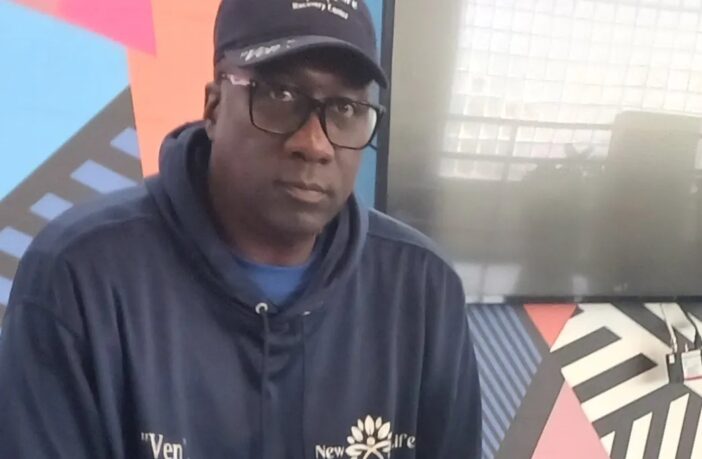By Catherine Pugh
Special to the AFRO
Five years ago Vennieth McCormick struck out on a path to help people challenged with substance abuse disorders. He wanted to change lives. He wanted to give hope. And he knew he could make a difference.
McCormick believed since he overcame his own struggle with alcohol abuse 30 years ago, his story could serve as proof that a more productive life was possible, even for those tightly clasped in the grasp of addiction.
“I would drive by, pass individuals on the street– some homeless–and see them. It was hard to turn and look away,” McCormick told the AFRO. “I knew that if only by the grace of God, it could be me.”
Venneith McCormick serves the community by providing shelter and healthcare for homeless people in Baltimore. (Courtesy Photo)
So, he took action. McCormick went on to build a fairly successful business in real estate and home improvement and began renting properties to organizations helping people with substance abuse disorders.
“I would run into some of those guys living in the rentals and end up in long conversations with them on what they needed to move their lives forward. “I can do this,” he thought and so, he did.
“I wanted to contribute to their success and every fiber of my body was telling me, I could do it– [I could] run a program with compassion and make a difference in the lives of people in need.”
“There was a lot to learn,” says Mr. McCormick. “I knew that counseling was necessary. What I realized most–and it goes back to Maslow’s Theory, Hierarchy of Needs– is that until you put a roof over someone’s head, it is hard to help them in any sustainable way.”
McCormick started with one house that he quickly filled with men in need of a place to stay. He connected them with programming and resources to manage addiction and some, over time, did complete the journey to a clean and sober lifestyle.
Over the past five years, McCormick’s program, New Life Recovery, has grown from one house to eight– including a house for women.
“Believe me when I tell you that many of the people laying on the streets of our nation are suffering from some form of substance disorders or mental health issues or both. It’s true and can complicate their problems if not correctly diagnosed and treated,” said McCormick.
The data proves him right.
According to the Substance Abuse and Mental Health Services Administration (SAMHSA), “over 582,000 individuals across the country were experiencing homelessness on a single night in 2022.” Of that number, “21 percent of individuals experiencing homelessness reported having a serious mental illness, and 16 percent reported having a substance use disorder.”
No easy solution
According to McCormick, a lot goes into running a housing unit for individuals with substance abuse and mental health issues.
“Once you house them, you have to feed and clothe them…and then you can help them deal with the reasons for their abuse, which requires mental and therapeutic help,” he told the AFRO.
Every individual coming through New Life Recovery has access to those services.
More recently, McCormick consolidated his program. He has acquired new accommodations for New Life Recovery in the form of a downtown Baltimore hotel, with over 100 beds, located at 110 St. Paul St.
McCormick described what the hotel space looked like before New Life Recovery took over.
“It had become a place for homeless individuals or folks on assistance, paying very low rent, to hang outside,” he said. “You knew it was not your ordinary apartment building or living quarters, because in front of the building and sitting around the fountain were individuals who looked like they were in need, lost or struggling with a substance or mental disorder.”
Today, the atmosphere around the hotel is different. In acquiring the new accommodations, McCormick is able to provide housing for individuals suffering from substance abuse, mental health issues and homelessness. The loitering that previously occurred, has subsided.
McCormick also acquired the restaurant attached to the hotel, where he provides meals for the occupants.
“I am used to serving meals to our clients. We have a regular dietician who prepares our meals,” he said.
During the holidays, McCormick and New Life Recovery staff provide meals to homeless individuals. The AFRO has covered his efforts to serve in the past.
“It is an opportunity to talk with people and offer them our assistance. Some take us up on it right away, while others may return at a later date,” he said. “At the least they learn about our program and know where we are.”
“The need in Baltimore to house individuals–male and female– suffering from substance abuse disorders, mental health issues and homelessness is great,” says Mr. McCormick. “We want to continue to be a part of the solution. I am in the process of acquiring the hotel next door, at 100 St. Paul St., that will provide 160 beds with 100 rooms. It is currently under renovation.”
The hotels offer a means for New Life Recovery to help more people immediately and centralize their counseling and mental health services.
“Everything clients need are provided on sight,” said McCormick, who has moved all of his clientele into the hotel setting.
The accommodations are much like a hospital, however the rooms are more private like those seen in a hotel. Similar to the expectations required in his earlier ventures provided, clients participating in today’s New Life Recovery programming must abide by rules and regulations that include specific guidelines and curfews.
While the sacrifice might be great, the reward is even greater.
“Everyone living in our program can get mental health counseling,” said McCormick. “I’ve learned if you are homeless, then you need our mental health services– something has you on the street that you need to face. There is a saying, ‘that you have to face it to fix it.’ And here at New Life Recovery we help our clients do just that.”
New Life Recovery is working in partnership with the University of Maryland to provide training for individuals who are ready to go to work, while also providing continued support to fully recover from experiencing homelessness.
McCormick likes the new accommodations for his program and says he looks forward to the expansion to 100 St. Paul Street adding additional accommodations. The expansion thus far has enabled him to put more time into other areas of New Life Recovery.
“I don’t have to spend half my day running around from place to place and picking up supplies and dropping off clothing. It is consolidated,” he said. “I get to spend more time here with the folks residing here, participating with the training, and watching them…prayerfully leave here whole. I’m grateful. I think they are too!”



